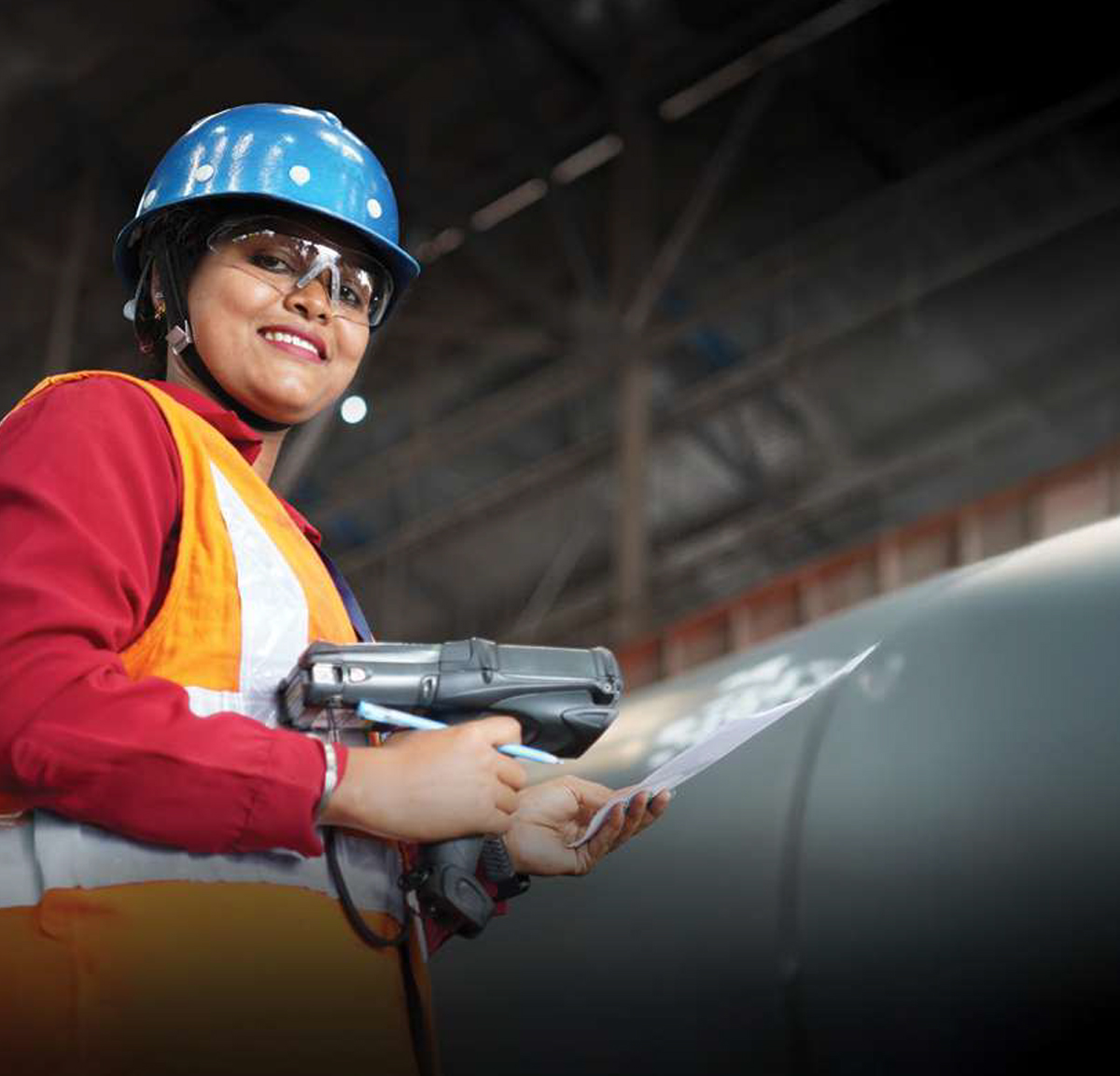
Diversity mix
Tata Steel’s diverse workforce of over 76,000 people across India, Europe, Southeast Asia, and North America forms the foundation of its long-term resilience. Our strategy prioritises productivity, safety, and competitiveness to drive sustainable growth across geographies.
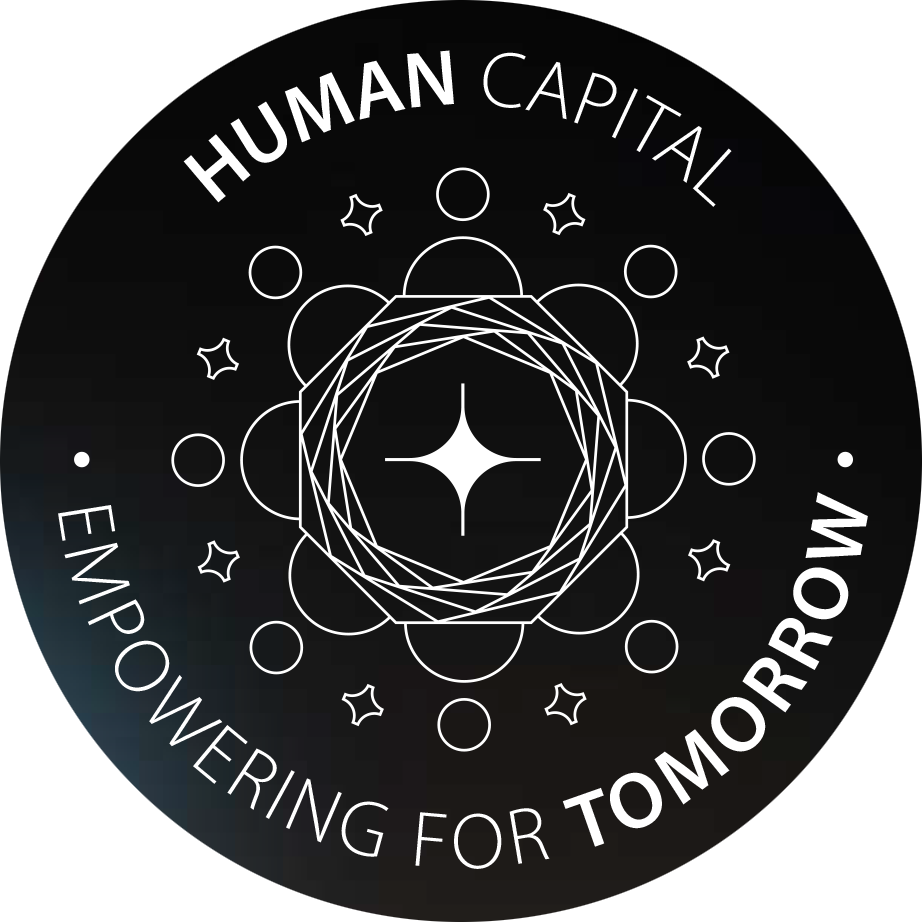
Human Capital
As the Company pursues capacity expansion in India and transitions to low-emission steelmaking in Europe, the strategic pivot demands building project execution capability and increasing workforce productivity, reskilling and upskilling employees in sustainable manufacturing and engaging the workforce through change management.
Pursuing benchmark productivity
India operations
In India, to realise the economies of scale with the growing capacity, Tata Steel imparted training to over 3,500 employees in critical areas such as Generative AI (Artificial Intelligence), Hydrogen Safety, and Carbon Capture. The launch of DIVYAshala, an immersive learning platform integrating VR (Virtual Reality), gamification, and simulator-based training, has redefined experiential learning. To unlock latent value across the steel value chain, the Company also runs the ASPIRE programme (to foster continuous improvement using Theory of Constraints principles), recognising and rewarding employees engaged in projects that impact organisational cost and time efficiency.
Demonstrating deep importance and sensitivity to maintaining industrial harmony, in FY2024-25, Tata Steel ensured a smooth, disputefree demobilisation of around 20,000 contract workers after project completion. Additionally, structured wage agreements and payroll integration across merged entities reinforced workforce stability and operational efficiency.
In FY2024-25, around 1,400 employees voluntarily separated from the Company through Sunhere Bhavishya Ki Yojana (for workers) and Second Innings (for officers) schemes. This initiative has increased the overall productivity from 900 to 925 tonnes of crude steel per employee per year (tcs/emp/year).
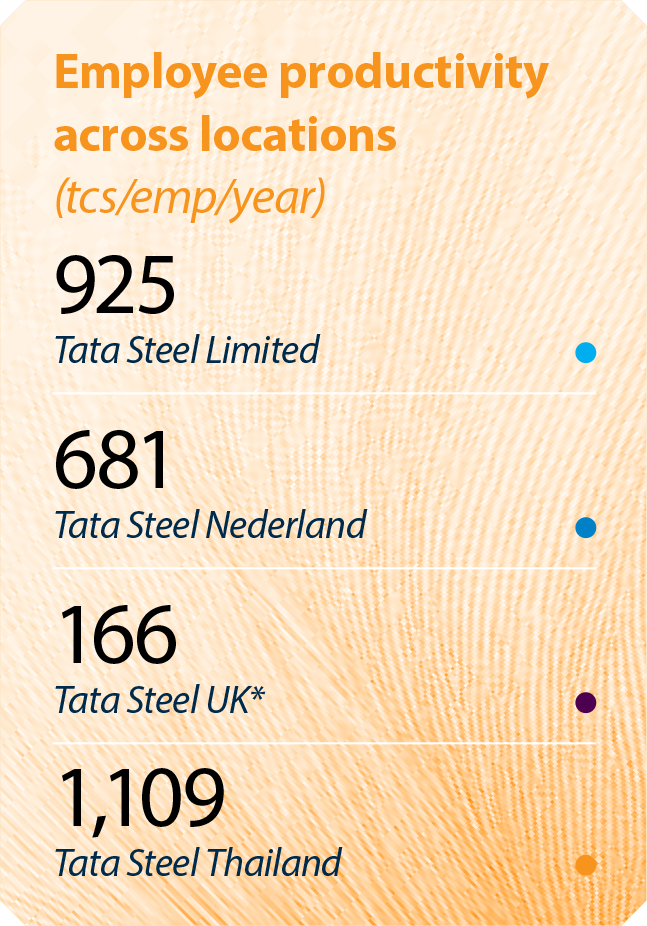
*Tata Steel UK's all heavy-end operations were shut down on September 30, 2024.
Tata Steel Nederland
To make its Netherlands operations more competitive and efficient, Tata Steel has undertaken a comprehensive transformation programme built on a multipronged approach of maximising production efficiencies, lowering fixed costs and optimising product mix and margins. The programme entails changes in organisational structure, potentially impacting ~1,600 management and support positions. As per process, a Request for Advice for the transformation plan has been submitted to the Central Works Council and trade unions have been informed. An effective and comprehensive consultation process will be run on the proposed changes.
Tata Steel UK
In the UK, our human capital strategy includes managing large scale workforce transition due to the planned shutdown of blast furnaces at Port Talbot, with emphasis on 1,800+ voluntary retirements, redeployment, and transition support mechanism. The Voluntary Redundancy Aspiration Process was actively managed across collectively recognised areas, enabling cross-matching of employees to other roles, delivering outplacement support, and collaborating with external partners to provide reskilling and training opportunities. These efforts are central to preparing employees for a successful future beyond the transformation.
Amid this major change, Tata Steel UK remains committed to excellence in people development. The Training Academy Team at TSUK was honoured with the prestigious Princess Royal Award for their outstanding training and skills development through apprenticeship and trainee programmes across the business.
Tata Steel Thailand
To boost employee productivity through technology adoption, Tata Steel Thailand conducted training sessions on technical skills and new technologies like Power BI and generative AI, achieving a total of 5.8 training person-days, surpassing the target of 5.5. Furthermore, a pipeline was established for Engineer Trainees, Technician Bench Strength, and Diploma Trainees to support various functions within the organisation.
Diversity and collaboration as levers to competitiveness
A diverse workforce is a strategic enabler of innovation and global competitiveness. In FY2024-25, Tata Steel Limited achieved its goal of 20% diversity in its operations. Tata Steel operationalised the world’s first all-women mining shift in an iron ore mine at Noamundi. It also onboarded the second batch of transgender HEMM (Heavy Earth Moving Machine) operators at its West Bokaro Division and proactively hired Persons with Disabilities (PwDs) as Security Control Room Operators, ensuring representation across roles and levels.
At Tata Steel Nederland, efforts to increase the participation of women in technical and leadership roles and to strengthen cultural diversity are supported by internal networks such as the Female Network, Rainbow Network and Taskforce Social Safety. Tata Steel Thailand has also made notable progress in promoting women's participation and enhancing employee well-being, with women representing 20% of management roles.
Tata Steel recognises the power of synergy by leveraging the strengths of its geographically diverse workforce. In June 2024, the Company launched the One Tata Steel programme to drive global synergy, integration, and accountability.
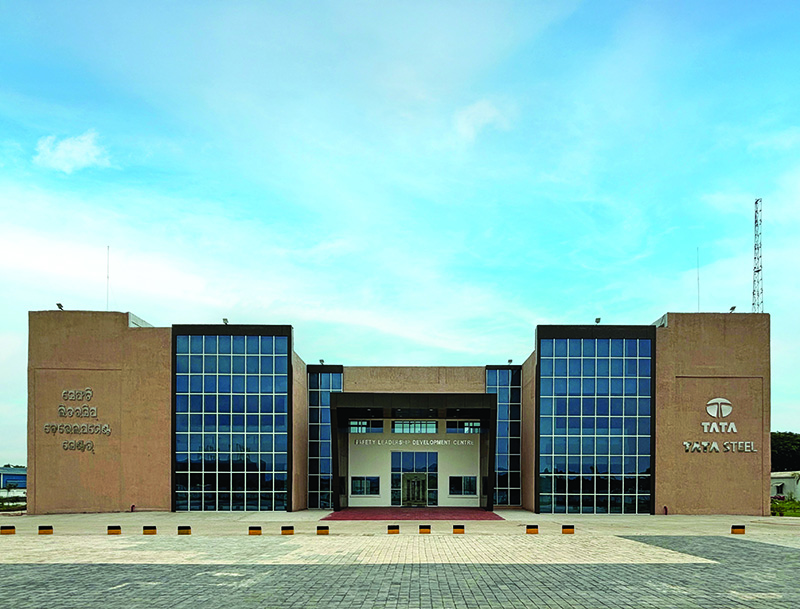
Safety Leadership Development Centre, Tata Steel Kalinganagar
Prioritising employee safety
Tata Steel is firmly committed to achieving a zero-harm workplace. The Safety, Health, and Environment (SHE) Committee of the Board collaborates closely with the Apex Safety Council, led by the CEO & MD. The structure ensures that safety and health considerations are seamlessly integrated into the Company's monthly review processes and promotes accountability through all organisational levels.
Tata Steel has consistently enhanced its safety leadership capabilities and improved contractor safety management practices through initiatives like the integration of risk awareness across operations, which has significantly improved safety management protocols. Leveraging generative AI to upgrade the safety management platform, EnsafeNxt, streamlines the process for logging safety observations and enriches insights derived from the extensive organisational data. The Company has also enhanced its IT systems for Project Hazard Studies to seamlessly incorporate learnings from past incidents into the design and operation of new facilities.
The Safety Performance Index (SPI) 2.0, featuring a refined set of safety Key Performance Indicators (KPIs) and scoring logic, further encourages employee engagement with safety practices. The revised Tata Steel Group Health and Safety Policy was made available in multiple vernacular languages across all Tata Steel sites, enabling deeper engagement to foster a more inclusive safety culture.
To bolster safety at operational sites, new Safety Alert Command Centres have been established at key locations, including Jamshedpur, Kalinganagar, Meramandali, and Raw Material locations. These centres provide real-time monitoring and facilitate prompt responses to safety incidents. Additionally, mini Safety Leadership Development Centres (SLDCs) have been launched at selected plants to train personnel in essential safety standards and life-saving rules. An integrated Command Centre has also been established for effective oversight of fleet movement, utilising a Driver Fatigue Monitoring System.
The Company conducts extensive audits on risk perception and deployment of safety standards across major locations like Jamshedpur, Kalinganagar, Meramandali and Gamharia. Such audits validate past recommendations and nurture a proactive stance towards safety. Quarterly audits of Operation & Maintenance (O&M) vendors further ensure that contractors' practices meet the safety standards. Over 130 employees across leadership levels have completed the Process Safety Management (PSM) certification programme. More than 1,000 employees have undergone training on Risk Perception and Decision Making. The ‘5 Safe Steps Forward’ campaign was launched to target key fatality risks through prevention and risk mitigation. A robust Consequence Management Policy ensures accountability for violations of life-saving rules across all sites.
Tata Steel Nederland's TrueSafe Programme, launched in FY2024-25, follows a comprehensive safety culture gap analysis, enabling departments to identify and address safety deficiencies. The IJmond Safety Platform facilitates collaboration with Tata Steel’s top sub-contractors, for shared learning on safety initiatives and training.
In Tata Steel UK, new designs and modifications of assets adhere to current mandatory and recognised industry standards. Hazard studies are conducted to ensure safe and reliable operations. Routine inspections of workplaces, equipment, and infrastructure are carried out through the Salus reporting system and SAP maintenance scheduling. Employees can report concerns, and actions are taken to maintain a safe workplace. Specific assets, such as lifting equipment and pressure systems, undergo thorough examinations by qualified professionals. Additionally, surveillance programmes assess occupational health risks, including noise and hazardous substance exposure. Audits ensure effective implementation of standards, while a team of competent personnel advises on health, safety, and welfare practices.
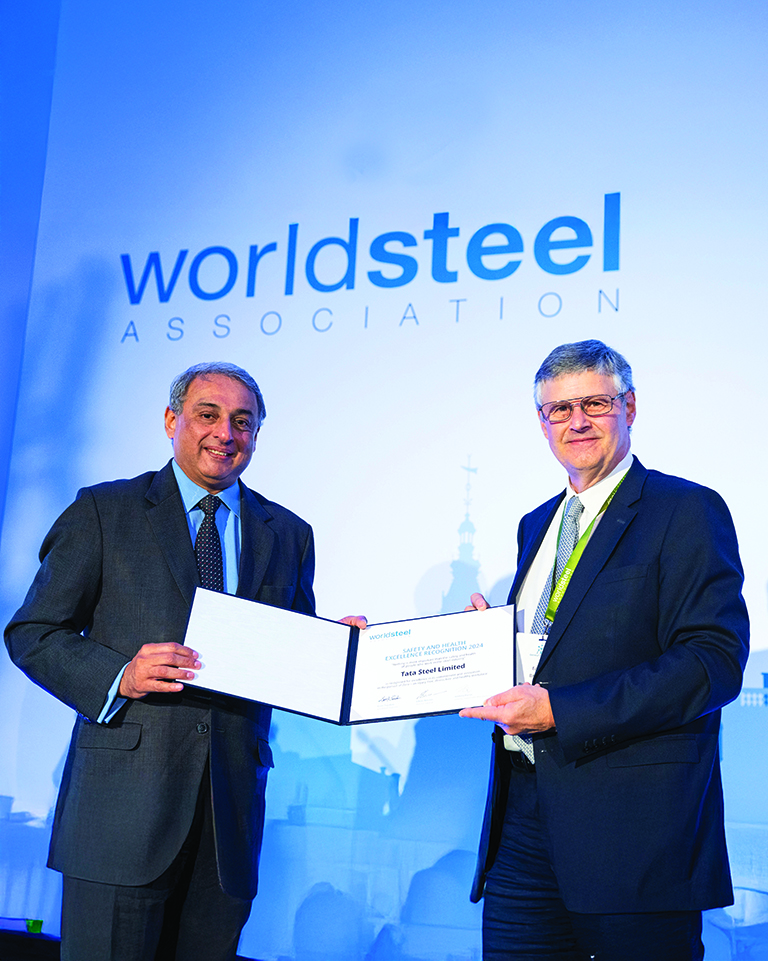
Safety and Health Recognition 2024 by worldsteel
Tata Steel’s safety accomplishments have been recognised by the World Steel Association for Excellence in Safety and Health in Process Safety Management, particularly for an innovative online purging assistance system designed to mitigate explosion risks in blast furnace gas cleaning plant.
Despite all serious efforts and recognition, Tata Steel experienced five fatalities in India, during the year. Though there was a 17% reduction in Lost Time Injuries (LTIs) v/s FY2023- 24, the fatalities press the need to further scrutinise the Company’s safety mechanisms and practices. As it adopts stricter vigilance mechanisms and more rigorous assessment of its practices, Tata Steel remains devoted to improving workplace safety.